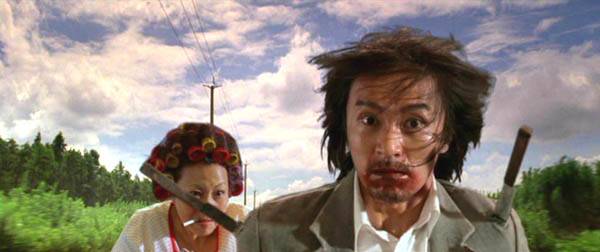The Wong Fei-hong series exudes nostalgia for the recent past that could not be recaptured. Speaking of the earliest phase of the series, Po Fung notes:
The world of Wong Fei-hong films of this phase was one of old Guangzhou, and the milieu of the 1950s suggested that these films were made by Guangzhou immigrants for Guangzhou immigrants, who remained aloof and detached from their adopted home…the rich vernacular details in Wong Fei-hong films expressed their nostalgia of the lost world—Guangzhou.

Unlike the Wong Fei-hong series, Kung Fu Hustle does not directly conjure up a lost Guangzhou ; rather, its “lost” Shanghai alludes to a past cinematic world of Shaw Brothers films and Bruce Lee movies as well as the cinematic world of Wong Fei-hong. A tribute to the Hong Kong martial arts films of the past, Kung Fu Hustle takes up this legacy—combining comedy and martial artistry, Confucian virtues with violent spectacle. The martial arts choreographer for the film, Yuen Woo Ping, of course, is no stranger to Wong Fei-hong or his cinematic legacy. His father, Simon Yuen, trained in Peking Opera, worked on several of the Wong Fei-hong films with Kwan Tak Hing. Yuen Wo-Ping directed Jackie Chan as Wong Fei-hong in Drunken Master (1978). He had Kwan Tak-Hing reprise his role as Master Wong in the biography of his student Lam Sai-Wing (Sammo Hung) in The Magnificent Butcher (1979) as well as Dreadnaught (1981). He even has a girl play the young master Wong in Iron Monkey (1993), and he did the fight choreography for Tsui Hark's version of the Wong Fei-hong story, Once Upon a Time in China (1991). Sammo Hung, no stranger to Wong Fei-hong films himself (e.g., Hung directed Once Upon a Time in China and America, 1997, and played Wong Fei-hong in the Jackie Chan vehicle Around the World in 80 Days (2004), did some additional action choreography for Kung Fu Hustle.
However, unlike the Wong Fei-hong series, Kung Fu Hustle does not allude directly to the martial arts world to establish its authority. Rather, it cites a cinematic legacy as carefully as The Story Of Wong Fei-hung : Part I outlines its Hung Gar lineage. While the Wong Fei-hong series points to a historical master, Kung Fu Hustle draws on the world of Hong Kong cinema for legitimacy. The title of the film in Chinese is simply “kung fu”—literally, the skill learned through hard work that could be martial arts or any of the other “skills” mastered by the characters in the film from sewing to cooking. “Kung fu” immediately conjures up the “golden age” of the Hong Kong kung fu film from the 1950s-1970s, from Kwan Tak-Hing through Bruce Lee, before the comic turn of Jackie Chan and the ascendancy of comedians like Stephen Chow and the Hui Brothers.

However, in English, the word “hustle” is added to the title. This addition creates a different meaning. In English, “kung fu” becomes a “hustle,” a streetwise way of deceiving others to survive, a hoax or trick played on the uninitiated. Given the film begins with a dance routine featuring the Axe gang, the “hustle” also conjures up the “disco fever” of the 1970s. Although the film is set in Shanghai in the 1930s, the 1970s world of Bruce Lee, spandex pants, and campy allusions to popular culture, including giant Pop Art-like billboards for mass-produced products like White Flower Oil and cartoon-like references to Batman and the Road Runner, provide the film with its principal visual style. The Shanghai alluded to in the film is not the historical Shanghai of the pre-war period depicted in Bruce Lee's Fist of Fury/Chinese Connection, but a vision of Shanghai filtered through the Hong Kong popular cinema of the 1970s.
|
